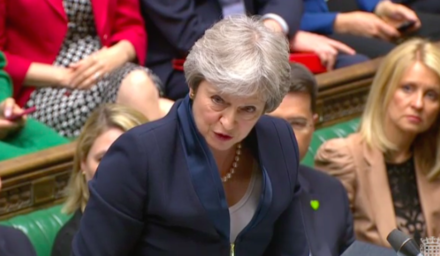
Much like the repetitive nature of PMQs itself, I find myself wondering the same thing every week: what do you ask a Prime Minister who refuses to answer a question? Today Jeremy Corbyn chose the NHS as his PMQs topic. He noted that Surrey NHS paid Virgin Healthcare £1.5m – not for providing any service, but because its bid wasn’t chosen. He said according to a new report, outsourcing has “put patients at risk of serious harm”. He pointed out that the government promised 5,000 more GPs in 2015, but there are now 1,000 fewer GPs. “The NHS has undergone the biggest funding squeeze in history,” the Labour leader said.
I’d hoped Corbyn would choose Brexit because there is plenty of material to go on: cabinet splits over customs arrangement options, backlash against the ‘backstop’, Boris Johnson and Jacob Rees-Mogg’s open criticisms of the Prime Minister, Michael Gove’s attack on Philip Hammond. May might have quoted soon-to-be Labour MP for Lewisham East Janet Daby, who has openly backed continued membership of the single market and customs union, to show Labour is divided over Brexit too. But that would be a poor defence.
Opting for Brexit would have made the Prime Minister squirm. Instead, she got to bang on about the NHS under Labour in Wales and strangely deflect by pivoting to Labour’s handling of the economy. Corbyn perhaps should have focussed on the BBC’s report that some of the Lansley reforms, which came at a high cost to David Cameron’s government both in terms of finances and reputation, could be scrapped. There are cabinet rows over whether spending on health should be increased by 4 per cent (Jeremy Hunt’s preference) or kept under 2 per cent.
Ultimately, though, May simply never answers questions in a straight-forward way. She was on the back foot for much of the session, and the NHS is safe Labour territory. More than ever, PMQs is a farce – but that’s down to Theresa May.




More from LabourList
Almost half of Labour members oppose plans to restrict jury trials, poll finds
‘How Labour can finally fix Britain’s 5G problem’
‘The University of the Air – celebrating 60 years of Harold Wilson and Jennie Lee’s vision’